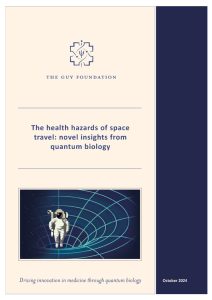HUMAN SPACE TRAVELLERS MAY FACE SERIOUS HEALTH HAZARDS, WARN QUANTUM SCIENTISTS
Humans venturing into space may face more serious health hazards than previously thought, according to a new report from The Guy Foundation, an independent UK research body. Conditions such as accelerated ageing, the development of insulin resistance, early diabetes and reproductive issues are likely to get worse the further we travel from Earth, says the report. These effects may be difficult or impossible to reverse and, if confirmed by research, will call into question the viability of human exploration in deep space.
The report, “The health hazards of space travel: novel insights from quantum biology”, has been prepared by a group of internationally recognised scientists drawn from disciplines including physics, quantum biology and space research. Studies of quantum effects in human biology at the atomic and subatomic levels suggest that disruption of the energy and information processing in our cells while journeying into space may damage our metabolism. This in turn could lead to more worrying health consequences. The report calls for these effects to be investigated and explained as a matter of urgency before longer distance journeys into space are undertaken.
“Up to now, the space community’s focus has been on the physical and engineering challenges inherent in space travel. These longer-term health issues do not seem to have been recognised. Nor have they been adequately addressed. ” said Professor Geoffrey Guy, Chairman of The Guy Foundation. “Just surviving in space is not the same as living in optimal health and thriving.”
George Freeman MP, former UK Minister of State for both Life Science and Space, commented,
“This report provides a pressing reminder of the effects of space travel on human health and has important implications for organisations such as NASA and SpaceX. At the same time, it highlights the opportunities for, and the value of, space health research.”
The report reviews existing research on how reduced and zero gravity in low-Earth orbit remove the stimulation which allows the body to keep cells healthy and generate energy. At the same time, increased radiation levels damage human DNA and reduce its capacity to repair and maintain itself. Even more significantly, the report highlights how cells may become further stressed beyond low-Earth orbit when the lack of a magnetic field and changes in the light spectrum disrupt their built-in equilibrium. This could compromise the metabolism of human and plant cells and disrupt both the circadian rhythms and the vital bacteria in the gut which underpin the working of our biological functions.
All these effects involve quantum-level processes, says the report. But research into them is currently hampered by a lack of relevant data. Although there is some openly available information on returning astronauts, there is much less on their long-term health outcomes.
In addition, there is not enough long-term data available on larger numbers of humans, or even small animals, to ensure the safety of increasing numbers of space travellers. The report notes that most astronauts have been young, healthy and fit. What happens to less fit or older individuals is not well understood, especially for longer-term missions.
Further experiments are urgently needed to improve our understanding of the underlying causes of space-induced ill health, and potential approaches to mitigate it, adds the report. These should include biological measures of astronauts’ ageing, as well the impacts at cellular and sub-cellular levels of ionising radiation, hyper and hypo-magnetic fields, microgravitational fields, and non-ionising radiation (light).
The report suggests that the only way humans may be able to live in optimal health in space will be by reproducing Earth’s environment exactly or, as a compromise, working out which factors are most important in causing these illnesses and accepting their limitations. It concludes by inviting interested scientists and organisations to work towards a better understanding of the topic and apply it to improving health for humans in space and on Earth.
To find out more about The Guy Foundation Space Health Programme, visit the webpage here.
Notes to Editors
The full report and a 5-minute talk on its contents are available at www.theguyfoundation.org/space-health.
Low-Earth orbit Almost all space exploration thus far has taken place in low-Earth orbit (below an altitude of 1,200 miles). The ISS orbits at an average altitude of only 250 miles, and very few of the 700 or so astronauts who have been to space have ventured beyond this horizon. Plans to go beyond, to the Moon, Mars and further into deep space, will have to factor in dramatic changes to the quantum environment, particularly the loss of the Earth’s magnetic field, which retains some influence in low-Earth orbit.
The Guy Foundation is a UK-based charitable foundation (charity no 1178782) established in 2018 to facilitate thinking and research on the role of quantum mechanics and thermodynamics in living systems, with the ultimate goal of using this understanding to advance healthcare. The Foundation curates, leads and funds an inter-disciplinary research collaboration and has published a number of scientific papers. It supports the quantum biology community by convening online symposia on quantum biology and bioenergetics and it hosts an active network of over 200 scientists and institutions across the globe.
Professor Geoffrey Guy is Founder and Chairman of The Guy Foundation. Professor Guy, a physician, has 40 years’ experience in medical research and global drug development. He founded the drug delivery company Ethical Holdings plc in 1985 and led the company to its NASDAQ listing in 1993; in 1989 he founded Phytopharm plc, of which he was Chairman until 1997; in 1998 he founded GW Pharmaceuticals plc, a world leader in cannabinoid therapeutics, and was Chairman until its sale in May 2021. He has been the physician in charge of over 300 clinical studies and is the author of over 80 scientific publications.
Professor Alistair Nunn is the Director of Science at The Guy Foundation and a primary author of the report. Professor Nunn is a PhD biochemist with experience in clinical safety and medical communications. He specialises in mitochondrial function and the ageing process and what actually defines “health”, in particular from the quantum and thermodynamic perspective. He is an author on more than 20 scientific papers and has written chapters in two books. In 2019, he became a Visiting Professor at the University of Westminster, and now studies bioenergetics and quantum biology in association with the Research Centre for Optimal Health.
For further information, please contact:
Mark Rogerson, Press & PR, The Guy Foundation
press@theguyfoundation.org
+44 7885 638810
Download the Press Release:


